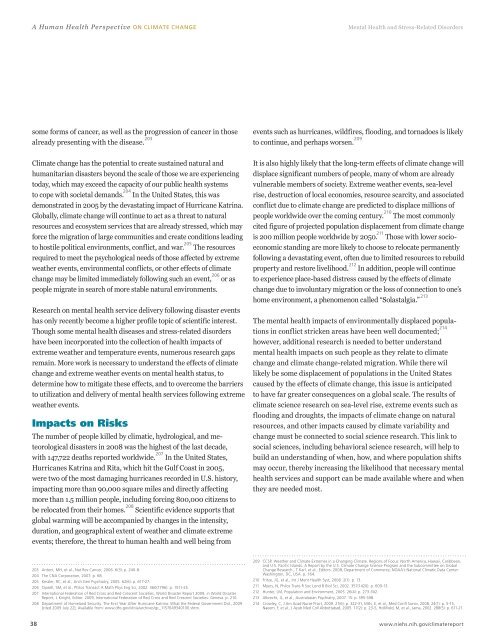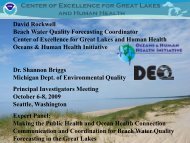A Human Health Perspective On Climate Change - The Oceans and ...
A Human Health Perspective On Climate Change - The Oceans and ...
A Human Health Perspective On Climate Change - The Oceans and ...
You also want an ePaper? Increase the reach of your titles
YUMPU automatically turns print PDFs into web optimized ePapers that Google loves.
A <strong>Human</strong> <strong>Health</strong> <strong>Perspective</strong> ON CLIMATE CHANGEMental <strong>Health</strong> <strong>and</strong> Stress-Related Disorderssome forms of cancer, as well as the progression of cancer in thosealready presenting with the disease. 203<strong>Climate</strong> change has the potential to create sustained natural <strong>and</strong>humanitarian disasters beyond the scale of those we are experiencingtoday, which may exceed the capacity of our public health systemsto cope with societal dem<strong>and</strong>s. 204 In the United States, this wasdemonstrated in 2005 by the devastating impact of Hurricane Katrina.Globally, climate change will continue to act as a threat to naturalresources <strong>and</strong> ecosystem services that are already stressed, which mayforce the migration of large communities <strong>and</strong> create conditions leadingto hostile political environments, conflict, <strong>and</strong> war. 205 <strong>The</strong> resourcesrequired to meet the psychological needs of those affected by extremeweather events, environmental conflicts, or other effects of climatechange may be limited immediately following such an event, 206 or aspeople migrate in search of more stable natural environments.Research on mental health service delivery following disaster eventshas only recently become a higher profile topic of scientific interest.Though some mental health diseases <strong>and</strong> stress-related disordershave been incorporated into the collection of health impacts ofextreme weather <strong>and</strong> temperature events, numerous research gapsremain. More work is necessary to underst<strong>and</strong> the effects of climatechange <strong>and</strong> extreme weather events on mental health status, todetermine how to mitigate these effects, <strong>and</strong> to overcome the barriersto utilization <strong>and</strong> delivery of mental health services following extremeweather events.Impacts on Risks<strong>The</strong> number of people killed by climatic, hydrological, <strong>and</strong> meteorologicaldisasters in 2008 was the highest of the last decade,with 147,722 deaths reported worldwide. 207 In the United States,Hurricanes Katrina <strong>and</strong> Rita, which hit the Gulf Coast in 2005,were two of the most damaging hurricanes recorded in U.S. history,impacting more than 90,000 square miles <strong>and</strong> directly affectingmore than 1.5 million people, including forcing 800,000 citizens tobe relocated from their homes. 208 Scientific evidence supports thatglobal warming will be accompanied by changes in the intensity,duration, <strong>and</strong> geographical extent of weather <strong>and</strong> climate extremeevents; therefore, the threat to human health <strong>and</strong> well being fromevents such as hurricanes, wildfires, flooding, <strong>and</strong> tornadoes is likelyto continue, <strong>and</strong> perhaps worsen. 209It is also highly likely that the long-term effects of climate change willdisplace significant numbers of people, many of whom are alreadyvulnerable members of society. Extreme weather events, sea-levelrise, destruction of local economies, resource scarcity, <strong>and</strong> associatedconflict due to climate change are predicted to displace millions ofpeople worldwide over the coming century. 210 <strong>The</strong> most commonlycited figure of projected population displacement from climate changeis 200 million people worldwide by 2050. 211 Those with lower socioeconomicst<strong>and</strong>ing are more likely to choose to relocate permanentlyfollowing a devastating event, often due to limited resources to rebuildproperty <strong>and</strong> restore livelihood. 212 In addition, people will continueto experience place-based distress caused by the effects of climatechange due to involuntary migration or the loss of connection to one’shome environment, a phenomenon called “Solastalgia.” 213<strong>The</strong> mental health impacts of environmentally displaced populationsin conflict stricken areas have been well documented; 214however, additional research is needed to better underst<strong>and</strong>mental health impacts on such people as they relate to climatechange <strong>and</strong> climate change-related migration. While there willikely be some displacement of populations in the United Statescaused by the effects of climate change, this issue is anticipatedto have far greater consequences on a global scale. <strong>The</strong> results ofclimate science research on sea-level rise, extreme events such asflooding <strong>and</strong> droughts, the impacts of climate change on naturalresources, <strong>and</strong> other impacts caused by climate variability <strong>and</strong>change must be connected to social science research. This link tosocial sciences, including behavioral science research, will help tobuild an underst<strong>and</strong>ing of when, how, <strong>and</strong> where population shiftsmay occur, thereby increasing the likelihood that necessary mentalhealth services <strong>and</strong> support can be made available where <strong>and</strong> whenthey are needed most.203 Antoni, MH, et al., Nat Rev Cancer, 2006. 6(3): p. 240-8.204 <strong>The</strong> CNA Corporation, 2007: p. 68.205 Kessler, RC, et al., Arch Gen Psychiatry, 2005. 62(6): p. 617-27.206 Tapsell, SM, et al., Philos Transact A Math Phys Eng Sci, 2002. 360(1796): p. 1511-25.207 International Federation of Red Cross <strong>and</strong> Red Crescent Societies, World Disaster Report 2009, in World DisasterReport, L Knight, Editor. 2009, International Federation of Red Cross <strong>and</strong> Red Crescent Societies: Geneva. p. 210.208 Department of Homel<strong>and</strong> Security. <strong>The</strong> First Year After Hurricane Katrina: What the Federal Government Did., 2009[cited 2009 July 22]; Available from: www.dhs.gov/xfoia/archives/gc_1157649340100.shtm.209 CCSP, Weather <strong>and</strong> <strong>Climate</strong> Extremes in a Changing <strong>Climate</strong>. Regions of Focus: North America, Hawaii, Caribbean,<strong>and</strong> U.S. Pacific Isl<strong>and</strong>s. A Report by the U.S. <strong>Climate</strong> <strong>Change</strong> Science Program <strong>and</strong> the Subcommittee on Global<strong>Change</strong> Research., T Karl, et al., Editors. 2008, Department of Commerce, NOAA’s National Climatic Data Center:Washington, DC, USA. p. 164.210 Fritze, JG, et al., Int J Ment <strong>Health</strong> Syst, 2008. 2(1): p. 13.211 Myers, N, Philos Trans R Soc Lond B Biol Sci, 2002. 357(1420): p. 609-13.212 Hunter, LM, Population <strong>and</strong> Environment, 2005. 26(4): p. 273-302.213 Albrecht, G, et al., Australasian Psychiatry, 2007. 15: p. S95-S98.214 Crowley, C, J Am Acad Nurse Pract, 2009. 21(6): p. 322-31, Mills, E, et al., Med Confl Surviv, 2008. 24(1): p. 5-15,Naeem, F, et al., J Ayub Med Coll Abbottabad, 2005. 17(2): p. 23-5, Hollifield, M, et al., Jama, 2002. 288(5): p. 611-21.38 www.niehs.nih.gov/climatereport










